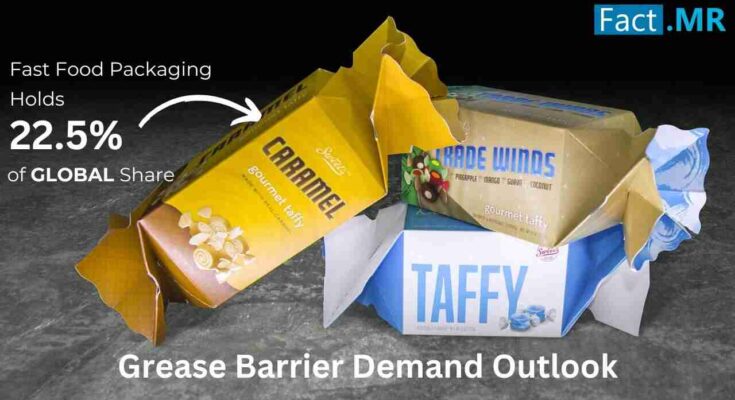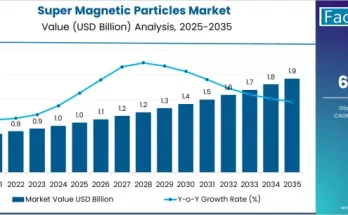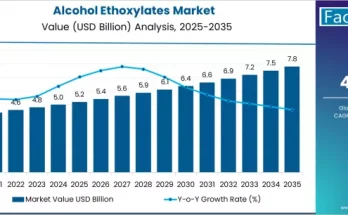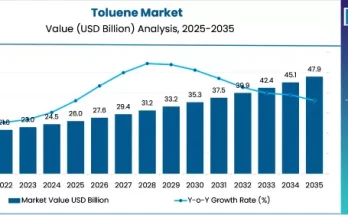The grease barrier market is the most emerging one in the packaging industry. Fast food, processed meals, and takeout culture have escalated the demand for adequate grease-resistant packaging more than ever. From pizza boxes to burger wrappers, microwaveable containers, and much more, grease barriers prevent food oils from seeping through packaging, thus keeping it sturdy and mess-free. As more consumers demand biodegradable and recyclable substitutes for their demand for sustainable and ecologically friendly products, so does the market trend. This transition is not only environment-relevant but also business-critical since it allows companies to comply with the evolving standards of modern regulations.
Due to various environmental concerns, biodegradable and compostable materials are good alternatives. Companies are experimenting with plant-based polymers, water-based coatings, and even cellulose-derived solutions to create packaging that performs well under greasy conditions while reducing environmental footprint. Offering high-performance, sustainable options quickly becomes a key differentiator for market leaders. This isn’t innovation confined only to sustainability. Functionality is the need, and manufacturers are now concentrating on developing packaging that can withstand high-temperature moisture and oil simultaneously.
Imagine a world without grease barriers—fast food wrappers leaking oil, pizza boxes unable to hold their contents without making a mess, and countless environmental concerns piling up. Grease barriers, though often overlooked, play a critical role in both consumer convenience and environmental sustainability. Let’s take a closer look at the grease barrier market, exploring its trends, challenges, and the opportunities it offers.
Sustainability is not just a trending word but it is a driving force shaping industries across the globe. Consumers today demand eco-friendly products, and businesses are responding by seeking grease barriers that are biodegradable, compostable, and recyclable. Traditional materials, often laden with harmful chemicals, are being replaced by plant-based alternatives and innovative coatings derived from natural sources. This shift presents immense opportunities for companies investing in research and development to create sustainable solutions that meet both performance and environmental standards.
In this evolving market, companies that have been adopting eco-conscious solutions are not only helping to reduce environmental damage but are also gaining an edge. As demand for greener products has been increasing, the grease barrier market will continue to expand and also offer businesses the opportunity to innovate and meet consumer expectations. Besides this, the movement towards sustainability also has been a significant opportunity for both established players and new entrants in the packaging industry.
The Role of Grease Barrier Coatings in Packaging and Sustainability
Whenever one thinks about packaging, grease barrier coatings might not come to mind immediately but they are certainly working behind the scenes to solve various messy issues. These coatings not only create a protective shield on materials like cardboard, paper, and plastic but also keep oil and grease from seeping through and ruining the packaging. Overall, for industries like food packaging, this turns out to be a good idea, as nobody likes a soggy burger wrapper or a pizza box with stains.
Moreover, grease barrier coatings also go beyond just keeping things easy and clean. They also help in other ways such as preserving the quality, taste, and food appearance. This also ensures a positive customer experience from the first bite to the last. These features are not just functional but these are evolving too. Recent advancements mean that grease barriers are not available in biodegradable and sustainable forms. This also means businesses can not only maintain the same high standards of performance but also align with environmental goals. Nowadays, consumers are focused on sustainability, and using eco-friendly solutions is not just smart but it is also essential. Companies investing in these coatings are not only just staying ahead of the curve but also delivering quality while taking a stand for the planet. This can be considered as innovation with impact.
Grease-Proof Paper Market: Meeting the Demand for Clean, Sustainable Packaging
The grease-proof paper market is quickly becoming a crucial part of the global packaging industry. Nowadays, hygiene, sustainability, and convenience drive consumer choices and this makes the food fresh, clean, and appealing. So, what makes this grease-proof paper so important?
The most essential aspect here is the treatment the paper undergoes to repel grease and oil. The grease-proof paper helps to contain the mess and also ensures that the packaging stays clean and your hands grease-free. This practical functionality has helped fast-food chains, bakeries, and delis across the globe. Also, it is not just about functionality but the market is rapidly evolving to meet the growing demand for eco-friendly solutions. As more consumers are prioritizing sustainability, businesses are growing towards grease-proof papers that are not just biodegradable but also made from renewable sources. These innovations are changing the game and also letting companies meet environmental goals without compromising on quality.
Apart from this, manufacturers have been focusing on multi-layered grease-proof papers that are equipped with enhanced thermal properties. Moreover, these advancements also make products more versatile and help expand their use beyond traditional food packaging. If we summarize it further, the grease-proof paper is not just growing but it is also adapting to recent trends and needs. This is an important part of the food packaging industry that is balancing practicality with sustainability. Businesses and consumers lie in smarter and greener solutions that continue to lead the way, making life a little cleaner.
- For instance, in March 2024, Archroma had launched Cartaseal® OGB F10. This is a water-based, PFAS-free barrier coating that was designed to replace polyethylene in packaging. This coating offers grease and oil resistance. Also, helps providing exceptional foldability, and recyclability and are also repulpable.
Grease Cartridges Market: Enhancing Efficiency and Sustainability in Industrial Maintenance
The grease cartridges market is an essential component in industries where machinery and equipment maintenance are critical to operational success. These cartridges are designed to store and dispense lubricants efficiently, ensuring that moving parts in machinery operate smoothly and endure longer. Industries like automotive, manufacturing, and construction heavily rely on these cartridges for reducing friction and wear, thereby enhancing the lifespan of mechanical systems. Recent advancements in cartridge technology focus on user convenience, offering features such as precision dispensing and tamper-proof designs. Additionally, the shift toward sustainable materials in grease cartridge production reflects a broader industry effort to minimize environmental impact. By adopting innovative grease cartridge solutions, businesses are optimizing operational efficiency while adhering to global sustainability goals.
Are Water-Based Barrier Coatings the Future of Sustainable Packaging?
Water-based barrier coatings have been helping the packaging market by providing a sustainable solution to protect materials from grease, moisture, and oil. These are widely used in food and beverage packaging and also ensure that these coatings remain fresh, clean, and safe while being environmentally friendly. When water is used as a base instead of harmful chemicals, these significantly reduce emissions of volatile organic compounds, making these a good alternative to traditional petroleum-based coatings.
Moreover, recent advancements in the market have also further improved the functionality, with biodegradable and recyclable options. These innovations have helped to improve durability to protect against grease and moisture in challenging conditions, and also to provide customizable features like compatibility with diverse materials and other features like heat resistance. Also, modern formulations combine seamlessly with high-speed production processes and offer manufacturers quality and efficiency. These are meeting consumer demands for eco-friendly solutions and also aligning with global sustainability goals, water-based barrier coatings are helping businesses balance safety and performance.
These coatings are perfect for food packaging like wraps and boxes, keeping products fresh and mess-free while being eco-friendly. Businesses using them not only meet safety standards but also show their commitment to sustainability—proving you can protect the planet without sacrificing quality.
Can you imagine how often we use microwaveable food containers? The effective grease barriers ensure that even after heating, they do not collapse and leak; hence, there would not be any leakage through them. So, it all comes to a perfectly seamless experience when consumed. This keeps the market interesting, fertile, and full of opportunities.
Get our comprehensive industry analysis for a complete market forecast
Though many factors drive the growth of the grease barrier market, Let’s talk about the important ones here:
- One of the major growth drivers for the grease barrier market is the robust food delivery and takeout industries. As people progressively became more comfortable with convenience food, especially during the aftermath of the COVID-19 pandemic, the requirement for stable packs also surged.
- Beyond the food domain, non-food applications, including cosmetics, pharmaceuticals, and even industrial products with high oil content, seek solutions where packaging could ensure grease resistance. This diversification opens the door for companies to reach and tap into multiple industries, and while doing so, create a more amplified customer base and add to market resilience. It is not, however, problem-free. While bio-based packaging is growing in use, it comes at the expense of relatively high costs. That might be a sticking point for small businesses looking to use environmentally friendly solutions. But designing affordable materials and yet still meeting food safety protocols is complicated work. Regional regulatory differences also cause headaches for companies because their packaging requirements might differ based on the region in which they are domiciled.
Key trends in the grease barrier market:
- High adoption of edible grease barriers is a very interesting new trend. The packaging waste in the food industry is a matter of great concern. This edible coating from natural ingredients which could be starch, proteins, and polysaccharides protects food but can also be consumed with food. Although the concept is still in its infancy, zero packaging waste is the main selling point. In conjunction with bio-active packaging that slows oxidation or microbiological growth that results in spoilage, the grease barrier of the future might indeed be both protective and edible.
- Smart packaging may prove to be the next wave to break on the grease barrier market. Companies are now designing sensing or indicator materials embedded within the packaging that can be alerted to the freshness of the food, detect levels of moisture or grease, or even change color if the integrity of the package has been compromised. Such technology not only enhances consumer experience but also reduces food waste due to the assurance of product safety and integrity. Certainly, smart packaging is an exciting combination with grease-resistant materials because another level of functionality is added without compromising sustainability goals.
- The hybrid type of material is another trend that is moving very fast. Instead of having one type of coating or material, manufacturers are using various natural fibers with bio-degradable polymers in combinations to develop multifunctional packages. Hybrid material thus produced would offer superior resistance to combined grease, heat, and moisture resistance, so would best suit more advanced food products such as frozen or microwaveable meals. It could also decrease the total cost of packaging, so Light undertakes business to overcome the price barrier of these eco-friendly solutions.
Many regulatory bodies come hard at single-use plastics and non-recyclable materials. Without them, companies operating in the grease barrier market are being forced into innovation by necessity; in other regions, regulations are pushing for compostable and non-toxic alternatives, accelerating the shift to plant-based and bio-based coatings. Innovations meeting these new regulations as well as performance requirements are the way to stay in the game. For instance, packaging waste directives in the European Union have been stringent enough to prompt an explosion of development for better, environmentally friendly solutions.
Future Ahead:
In summary, this grease barrier market is growing at a tremendous rate, driven by the pace of technological innovation, regulatory demands influence, and other changes in the behavior of consumers. There are indeed so many possible future directions for this market: from edible coatings to smart packaging and hybrid materials. As companies continue to innovate and adapt, the grease barrier industry will not only meet the challenges of today but will also pave the way to a more sustainable and technologically advanced future.
Looking ahead, a very bright future lies ahead for the grease barrier market, which is very much focused on the two key trends of sustainability and innovation. Material science might unlock ultra-thin, very efficient grease barriers based on renewable raw materials as companies push against the boundaries of current technologies. Even nanotechnology appears promising, enabling ultrathin coatings that can be adjusted to surpass conventional materials under their properties but need not be thicker. Meanwhile, an increasing global interest in reducing usage volumes for single-use plastics, will drive more significant penetration of paper-based alternatives and continue to move towards levels of grease resistance without any compromise in recyclability.
Conclusion:
Looking ahead, the future of the grease barrier market is promising and full of opportunities. With continuous innovations focused on durability, functionality, and environmental impact, there are a lot of opportunities for companies to stay ahead of the competition. Moreover, businesses that invest in sustainable technologies adapt to emerging trends that will not only enhance their operational efficiency but also contribute to a more sustainable future.
Besides this, continued R&D in this area is also pushing the boundaries and showcasing various opportunities. Key players have been staying agile to face the ever-evolving regulatory landscape and consumer preferences. Due to the high demand for greener products, companies that have been focusing on sustainable packaging will have a competitive edge. This is also going to help shape the future of the industry. The next generation of grease barrier -products are expected to be cleaner, adaptable, and more efficient.



